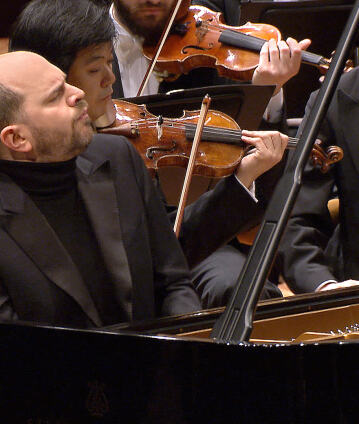Semyon Bychkov and Kirill Gerstein

Rarely has the Russian soul been captured in music so impressively as in Sergei Rachmaninov’s Piano Concerto No. 2 – in its melancholy brooding, its singing and revolt. In this performance with Semyon Bychkov, pianist Kirill Gerstein debuts with the Berliner Philharmoniker. Piotr Ilyich Tchaikovsky fosters a completely different attitude in his Third Symphony, which is shaped by the festive cheer and dancing brilliance of his famous ballets.
The premiere in 1897 of Sergei Rachmaninov’s First Symphony ended in an unparalleled fiasco. Was it really because Alexander Glazunov, who had been charged with conducting it, drowned out his stage fright in vodka? Rachmaninov, then shortly before his 24th birthday, was not in the mood to assign blame: he took responsibility for the failure, withdrew the work – compared by one critic with the ten plagues of Egypt – and decided to renounce composing. The consequence was a deep depression for which Rachmaninov ultimately had to seek medical treatment to overcome. The Moscow neurologist Nikolai Dahl succeeded in revitalizing the composer’s courage to face life and creative power – including through hypnosis according to Rachmaninov. Healed of his self-doubts, Rachmaninov wrote the Second Piano Concerto, dedicating it to the doctor, and launched it as soloist conducted by Alexander Siloti in Moscow in 1901, landing a worldwide success.
In this concert of the Berliner Philharmoniker, the Russian pianist Kirill Gerstein takes on the work’s solo part, which poses exorbitant technical difficulties. The conductor is Gerstein’s compatriot Semyon Bychkov, who is just as conversant with the sensual, truly mesmerizing power of Rachmaninov’s music as with the particular melancholy that characterises Piotr Ilyich Tchaikovsky’s compositions. Like Rachmaninov, Tchaikovsky did a lot of soul-searching about his abilities. For instance, the composer wrote in 1888: “I often have self-doubts and ask myself, hasn’t the time come to stop, have I overdone my power of invention?” The inner battles that Tchaikovsky had to struggle with when composing can also be heard in the music of his Third Symphony, called the Polish because of its last movement in the rhythm of a polonaise.
© 2016 Berlin Phil Media GmbH
Related interviews